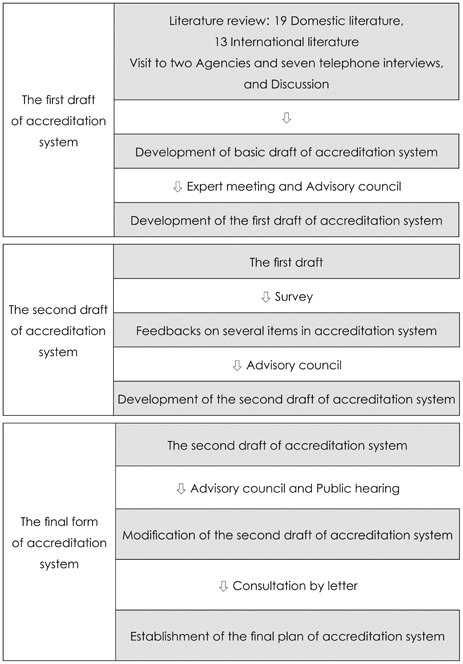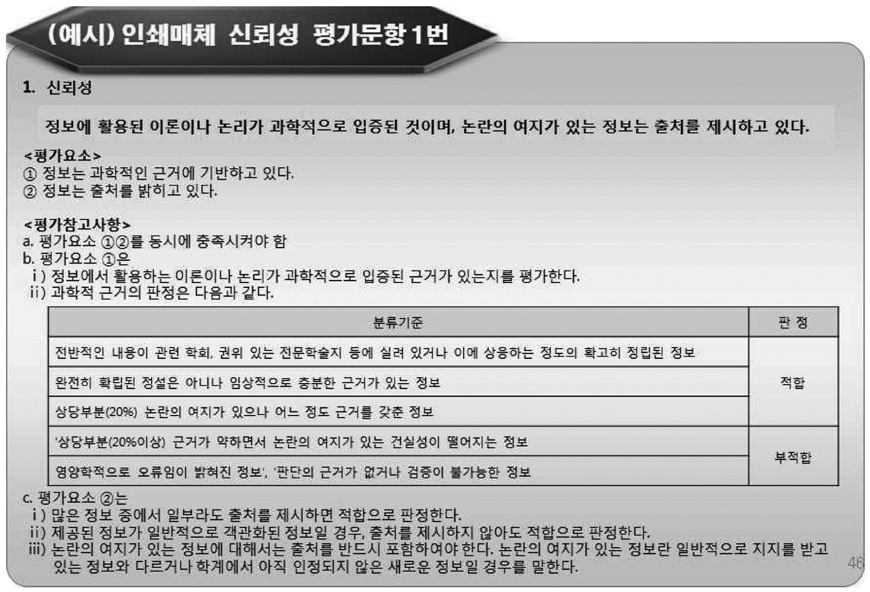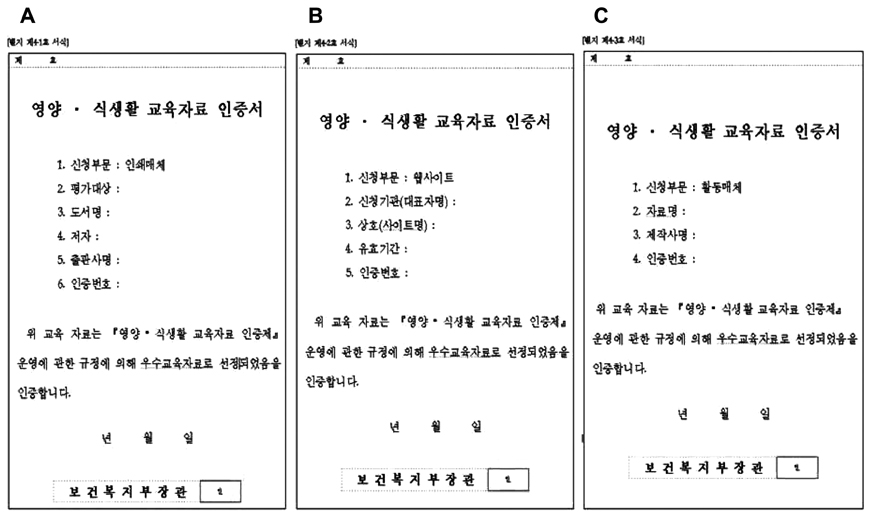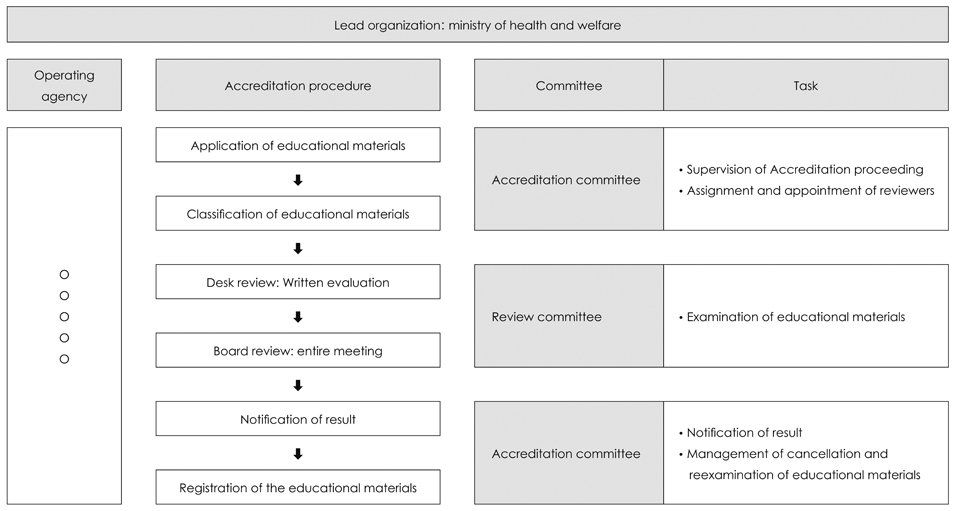J Nutr Health.
2014 Apr;47(2):145-156. 10.4163/jnh.2014.47.2.145.
Development of an accreditation system for dietary and nutrition related education resources
- Affiliations
-
- 1Food and Nutrition Major, Division of Food Science and Culinary Arts, Shinhan University, Dongducheon 480-777, Korea.
- 2Department of Practical Arts Education and Centre for Child Nutrition Education, Busan National University of Education, Busan 611-736, Korea. kalee@bnue.ac.kr
- 3Department of Medical Nutrition, Graduate School of East-West Medical Science, Kyung Hee University, Yongin 446-701, Korea.
- 4Department of Food and Nutrition, Changwon National University, Changwon 641-773, Korea.
- 5Department of Family Medicine, Dongguk University Ilsan Hospital, Goyang 410-773, Korea.
- KMID: 2210028
- DOI: http://doi.org/10.4163/jnh.2014.47.2.145
Abstract
- PURPOSE
The purpose of this study was to establish accreditation systems of reliable educational materials for nutrition and dietary life which could be used in schools, workplace, and health promotion.
METHODS
The study was conducted from April 2011 to October 2011. Literature reviews, institutional visits, and telephone interviews were conducted. Expert meetings and advisory councils were held in order to receive feedback on development of the accreditation systems. A survey was conducted for the accreditation procedures on 143 professionals, including professors, researchers, health and medical experts, teachers, nutrition teachers, dietitians, and clinical nutritionists.
RESULTS
The final procedure of the developed accreditation system was finalized as follows: 1) receiving application twice per year 2) complete desk review (written evaluation) by three reviewers within two months, 3) board review (all board members) and decision, and 4) no-tification of results. The accreditation system is set for printed materials, web-site, and materials for activities. The certificate and accreditation mark is issued to the final certified educational materials. Expiration date is established only for the web-site form. The accreditation length lasts for two years, and can be extended by renewal application.
CONCLUSION
The dietary and nutrition related materials, which are certificated by this accreditation system, could impart reliable information and knowledge to both learners and educators, and help them in effective selection of educational materials. Therefore, this accreditation system might be expected to increase satisfaction for teaching and learning about nutrition and healthy dietary life.
Keyword
Figure
Reference
-
1. Moon TH, Kim SC, Lee KA. Study of improvement certification system considering consumer protection. Seoul: Korea Radio Promotion Agency;2007.2. Ko DS, Lee DU. The improvement of Korean certification system. In : Proceedings of the Korea Technology Innovation Society Conference; Seoul: Korean Technology Innovation Society;2005. p. 139–149.3. Ryu SW, Ha YJ. The implementation of internet health information quality initiatives. Health Welf Policy Forum. 2003; (86):68–82.4. Park JH, Cho BL, Kim YI, Shin YS, Kim Y. Assessing the quality of internet health information using DISCERN. J Korean Soc Med Inform. 2005; 11(3):235–246.
Article5. Sohn A. Criteria for evaluating health information sites on the internet. J Korean Soc Health Inf Health Stat. 2000; 25(2):97–107.6. Health on the Net Foundation (CH). Trustworthy health and medical information: the Health on the Net initiative [Internet]. Chêne-Bourg: Health on the Net Foundation;2011. cited 2011 May 11. Available from: http://www.hon.ch/.7. MedCIRCLE (CA). Collaboration for internet rating, certification, labeling and evaluation of health information [Internet]. Toronto: MedCIRCLE;2011. cited 2011 Jun 20. Available from: http://www.medcircle.org/.8. Organizing medical networked information [Internet]. Bristol: Joint Information Services Committee;1996. cited 2014 Mar 3. Available from: http://www.omni.ac.uk/.9. Health Improvement Institute (US). Quality of health information on the internet [Internet]. Cambridge (MA): Health Improvement Institute;2011. cited 2011 Jul 2. Available from: http://www.hii.org/.10. Korea Institute for Health and Social Affairs (KR). Reliable health information. Guideline for health information use [Internet]. Seoul: Korea Institute for Health and Social Affairs;2011. cited 2011 Jun 20. Available from: http://www.healthpark.or.kr/.11. Korean Academy of Medical Sciences. Evaluation of health information [Internet]. Seoul: Korean Academy of Medical Sciences;2011. cited 2011 Jun 10. Available from: http://www.kams.or.kr/health/study.php.12. Korea Foundation for the Advancement of Science and Creativity. Good science books certification [Internet]. Seoul: Korea Foundation for the Advancement of Science and Creativity;2011. cited 2011 May 30. Available from: http://www.kofac.re.kr/.13. Korea Publication Ethics Commission. Audit and judging criteria [Internet]. Seoul: Korea Publication Ethics Commission;2011. cited 2011 Jun 10. Available from: http://www.kpec.or.kr.14. Ministry of Health & Welfare (KR). National nutrition management law. Legislation No. 10191 [Internet]. Seoul: Ministry of Health & Welfare;2011. cited 2011 Sep 25. Available from: http://law.go.kr/lsInfoP.do?lsiSeq=103895#0000.15. Kim C. A study on establishing the basic plan for national nutrition care/management in Korea. Cheongwon: Korea Health Industry Development Institute;2010.16. Lee KA, Kim JM, Park YK, Lee KH, Oh SW, Lee HS. Establishment of accreditation criteria for nutrition and dietary education materials. J Nutr Health. 2013; 46(5):470–481.
Article17. Korea Health Promotion Foundation. Excellent health book [Internet]. Seoul: Korea Health Promotion Foundation;2011. cited 2011 May 30. Available from: http://www.khealth.or.kr/Index.do.18. Ministry of Environment (KR). Excellent environmental books [Internet]. Seoul: Ministry of Environment;2011. cited 2011 Jun 2. Available from: http://www.me.go.kr/.19. Yu BM, Kim SW, Kim JJ, Kim HJ. Agricultural Education Program Accreditation Manual for managers of business operations. Suwon: Rural Human Resource Development Center;2010.20. Korea Web Accessibility Evaluation Center. Certification examination [internet]. Seoul: Korea Web Accessibility Evaluation Center;2011. cited 2011 Jun 20. Available from: http://www.kwacc.or.kr/.21. Web Accessibility Laboratory (KR). Quality mark [Internet]. Seoul: Web Accessibility Laboratory;2011. cited 2011 Jun 20. Available from: http://www.wah.or.kr/Certification/quality.asp.22. Database Quality Certification (KR). Introduction of database quality certification [Internet]. Seoul: Database Quality Certification;2011. cited 2011 Jun 20. Available from: http://www.dqc.or.kr/institute/certification.html.23. Fallis D, Frické M. Indicators of accuracy of consumer health information on the Internet: a study of indicators relating to information for managing fever in children in the home. J Am Med Inform Assoc. 2002; 9(1):73–79.
Article
- Full Text Links
- Actions
-
Cited
- CITED
-
- Close
- Share
- Similar articles
-
- Is accreditation in medical education in Korea an opportunity or a burden?
- The Development Tasks of Medical School Accreditation in Korea
- A Proposal for the Future of Medical Education Accreditation
- Analysis on the Performance and Tasks of Accreditation System for Medical Colleges
- A proposal for the future of medical education accreditation in Korea






